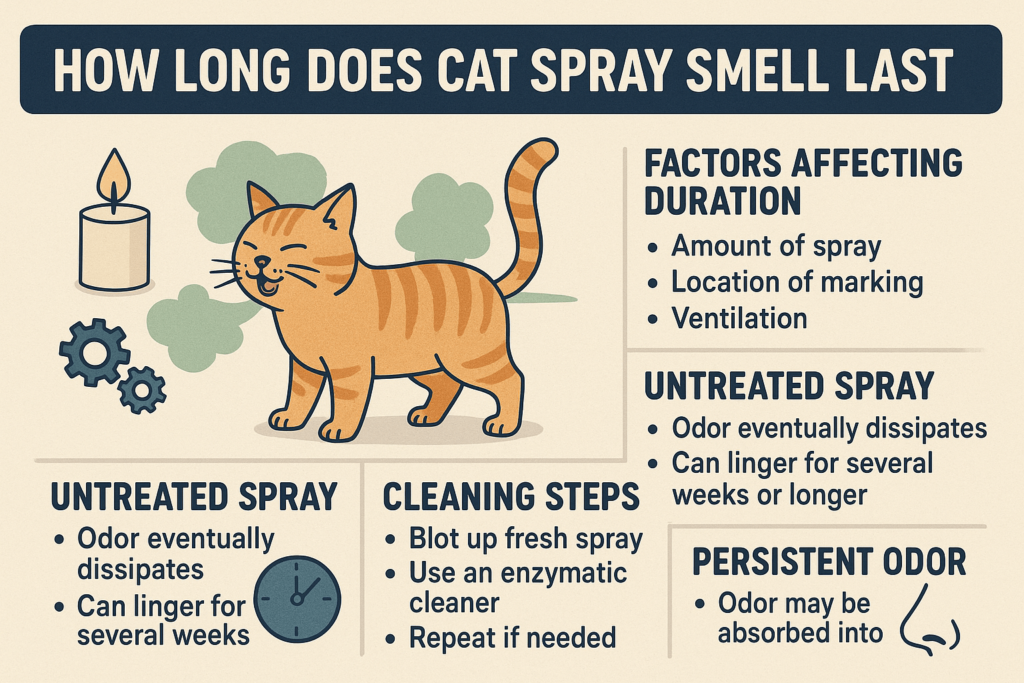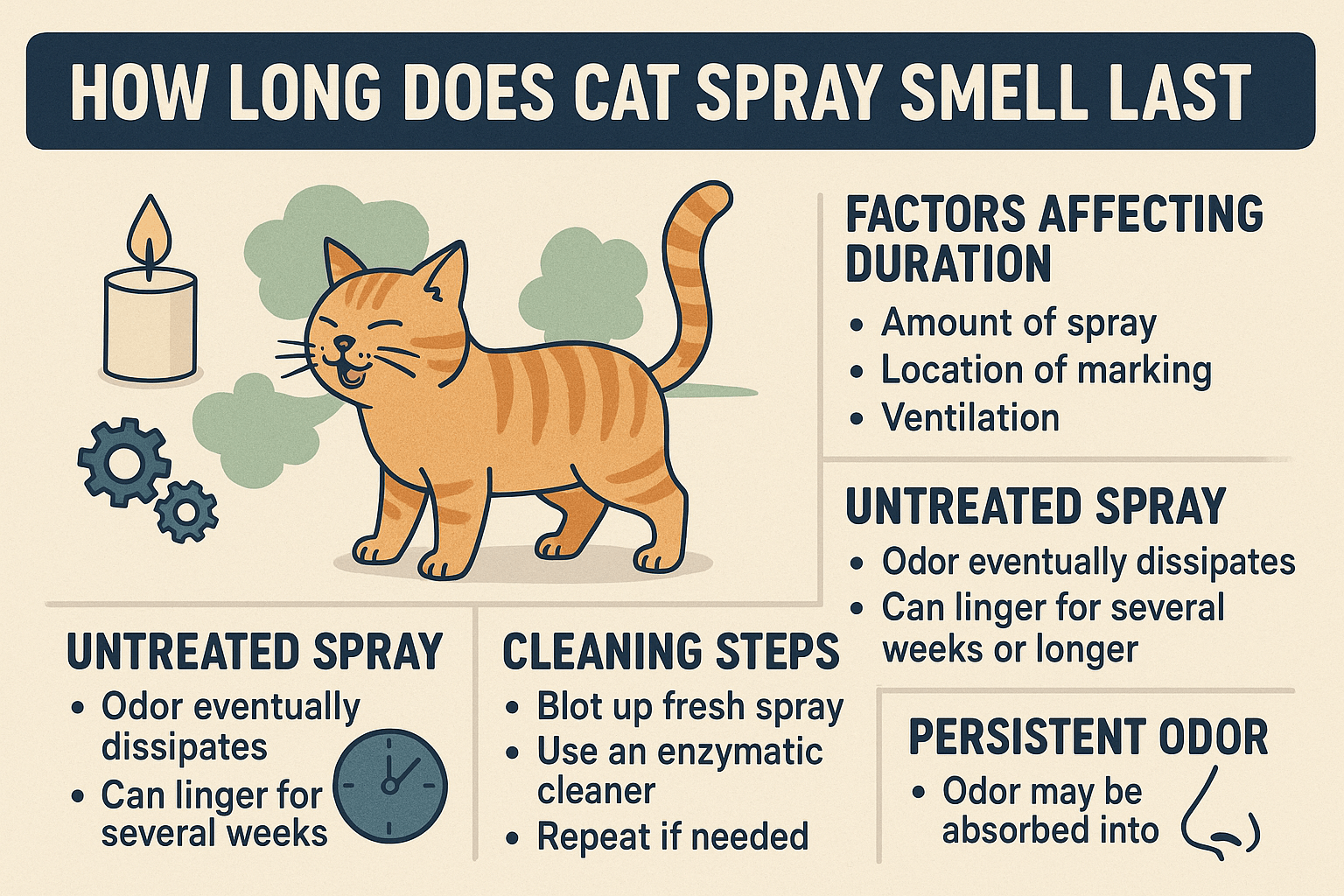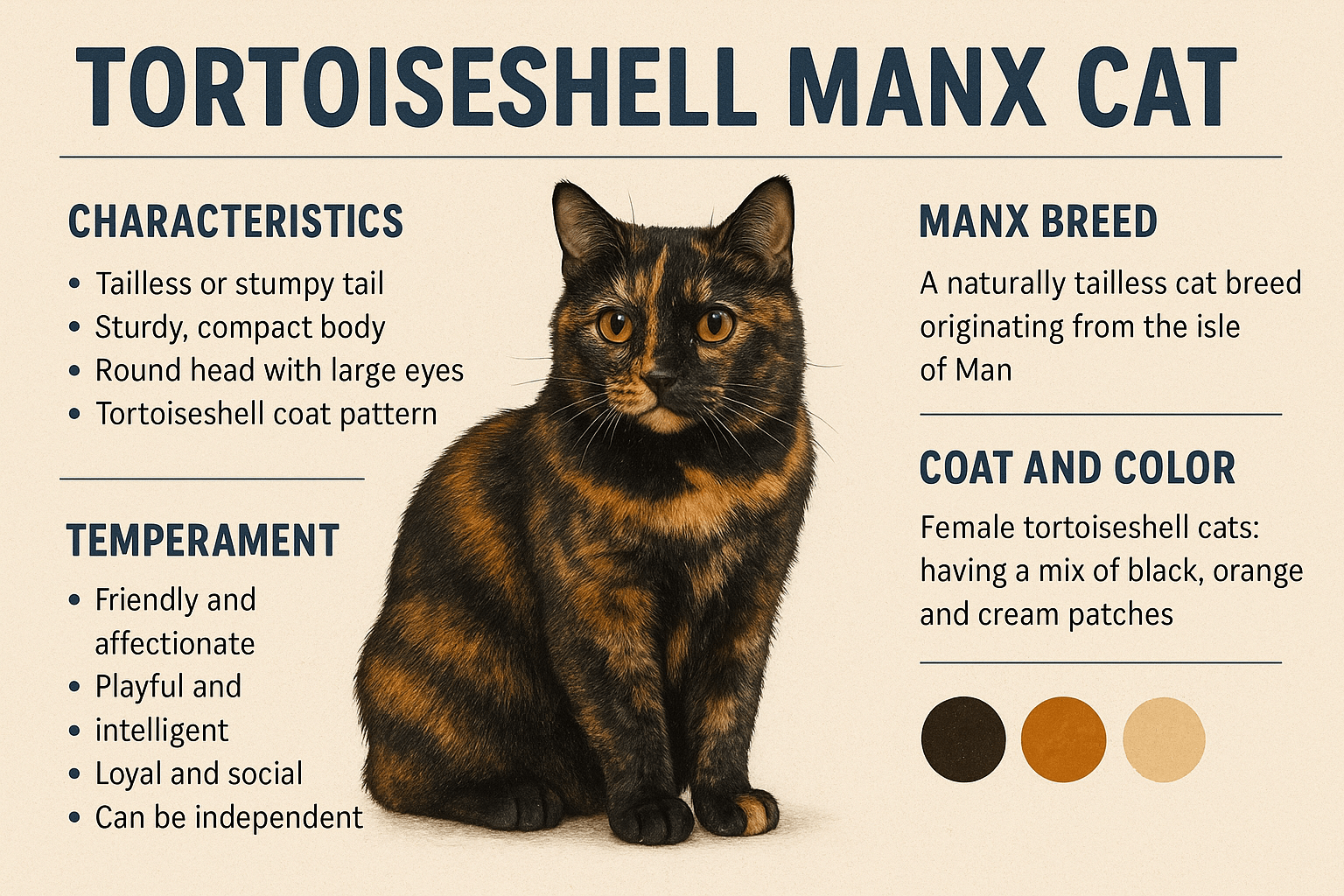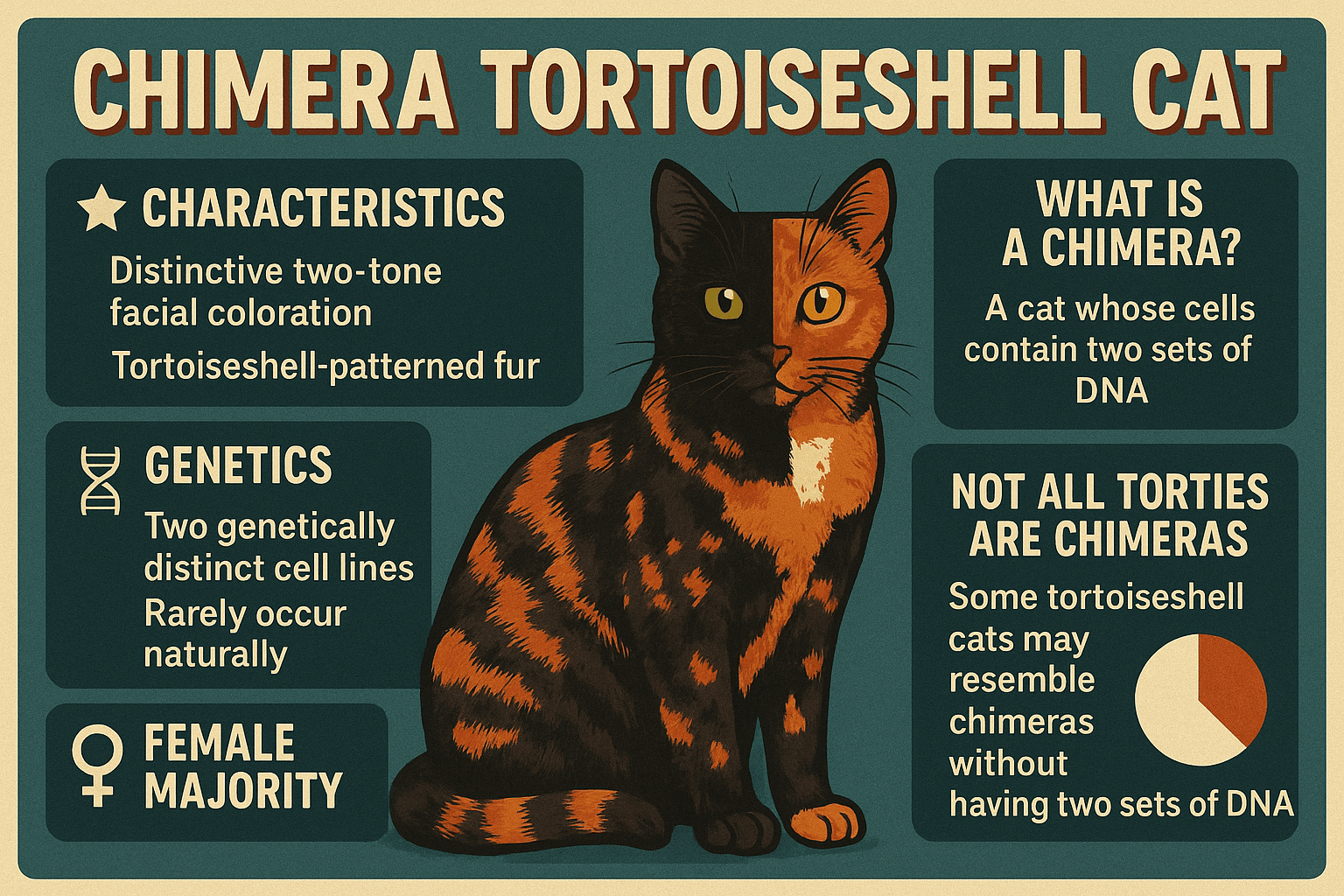How Long Does Cat Spray Smell Last?
Dealing with cat spray can be a challenging and unpleasant experience for any pet owner. The strong, pungent odor is not only difficult to eliminate but also lingers longer than expected if not addressed properly. Whether you’re dealing with territorial marking or stress-related spraying, understanding how long the smell lasts and how to effectively remove it is crucial. In this blog post, we’ll explore the factors that influence the persistence of cat spray odor, practical cleaning tips, and preventive measures to keep your home fresh and welcoming. Let’s dive into everything you need to know about managing this common feline behavior.
Expert Insight: Understanding Indoor vs. Outdoor Cat Spraying
“Indoor cats are more likely to spray indoors, which can lead to a stronger and more lingering smell. Outdoor cats may spray outside, which can dissipate more quickly due to the open air.”
— Dr. Jess
Factors That Influence How Long Cat Spray Smell Lasts
The duration of cat spray odor depends on several factors, including the materials it comes into contact with and the cleaning methods used. Understanding these variables can help you tackle the issue more effectively.
Surface Type:
Porous materials like carpets, upholstery, and curtains absorb odors deeply, making them harder to eliminate compared to non-porous surfaces like tile or metal.Frequency of Spraying:
Repeated spraying in the same area intensifies the smell and makes it last longer, as layers of urine compounds build up over time.Environmental Conditions:
Warm, humid environments can enhance the strength of the odor, while well-ventilated spaces may reduce its intensity more quickly.Cleaning Products Used:
Using water alone or inappropriate cleaners can fail to break down the chemicals in cat spray, allowing the smell to persist indefinitely.Age of the Stain:
Fresh stains are easier to clean, while older ones may require more intensive treatment due to dried-in residue and lingering pheromones.
By considering these factors, you can better anticipate how long the smell might linger and take appropriate steps to address it promptly.

Best Cleaning Methods to Remove Cat Spray Smell
Effectively removing cat spray odor requires using the right techniques and products. Here’s a breakdown of proven methods to neutralize the smell and restore freshness to your home.
Use Enzyme-Based Cleaners:
These cleaners break down the uric acid and ammonia in cat spray, eliminating the source of the odor rather than just masking it.Blot Before Cleaning:
Absorb as much of the liquid as possible with paper towels before applying any cleaning solution to prevent deeper absorption into fabrics.Test Cleaning Solutions First:
Always test cleaning products on a small, inconspicuous area to ensure they don’t damage delicate surfaces like upholstery or rugs.Ventilate the Area:
Open windows and use fans to improve airflow, which helps dissipate lingering odors faster after cleaning.Repeat Treatment as Needed:
Stubborn smells may require multiple applications of enzyme cleaner to fully neutralize all traces of the spray.
With these methods, you can significantly reduce—or even eliminate—the persistent smell of cat spray from your home.
Check this guide 👉What Does Cat Spray Look Like on Walls? Best 7 Tips!
Check this guide 👉What Does Cat Spray Smell Like? Best 7 Expert Tips!
Check this guide 👉Do Female Cats Spray? Best 7 Expert Tips!
Prevention Tips for Cat Spraying | Effective Cleaning Solutions |
|---|---|
Neuter or spay your cat to reduce spraying | Use enzyme-based cleaners for deep cleaning |
Provide multiple litter boxes in the home | Blot spills immediately to minimize damage |
Address stress triggers in the environment | Avoid ammonia-based cleaners (they worsen odor) |
Maintain a consistent routine for your cat | Ventilate the area during and after cleaning |
Consult a vet for behavioral issues | Repeat treatments until odor disappears |
Why Cat Spray Smell Is So Persistent
Understanding why cat spray odor lingers can help you approach cleanup with greater awareness and patience. Several chemical and biological factors contribute to its stubborn nature.
Uric Acid Content:
Cat urine contains high levels of uric acid, which crystallizes and adheres to surfaces, making it resistant to regular cleaning methods.Pheromone Markers:
Cats use spray to mark territory, leaving behind scent signals that are designed to last and communicate with other animals.Ammonia Compounds:
As cat spray breaks down, ammonia is released, creating an increasingly strong and unpleasant smell over time.Deep Penetration into Materials:
The liquid seeps into fibers and porous surfaces, embedding itself where conventional cleaning tools cannot reach easily.Reapplication by the Cat:
If the smell isn’t fully removed, cats may return to the same spot repeatedly, exacerbating the problem.
Recognizing these challenges underscores the importance of thorough cleaning and prevention strategies to combat cat spray odor effectively.
How to Prevent Future Cat Spraying Incidents
Preventing future spraying incidents is key to maintaining a harmonious living space. By addressing underlying causes and implementing proactive measures, you can minimize the likelihood of recurrence.
Neuter or Spay Your Cat Early:
Altered cats are far less likely to engage in territorial spraying behaviors compared to intact cats.Create a Stress-Free Environment:
Minimize changes to your cat’s routine and provide safe spaces where they feel secure and relaxed.Provide Adequate Resources:
Ensure there are enough litter boxes, food bowls, and resting areas to avoid competition among pets.Use Synthetic Pheromone Diffusers:
Products like Feliway mimic calming pheromones, helping to reduce anxiety-related spraying.Monitor Interactions with Other Pets:
Conflicts between household pets can trigger spraying; intervene early to resolve tensions.
Taking these preventative steps reduces the chances of future spraying episodes and promotes a peaceful home environment.
Common Mistakes When Cleaning Cat Spray
Avoiding common mistakes ensures that your efforts to clean cat spray are successful and efficient. Steering clear of these pitfalls can save you time and frustration.
Using Ammonia-Based Cleaners:
These products mimic the components of cat urine, encouraging your cat to respray the same area.Neglecting Deep Cleaning:
Superficial cleaning fails to address embedded residues, leading to lingering odors.Skipping Ventilation:
Poor ventilation traps odors indoors, prolonging their presence despite cleaning attempts.Assuming One Wash Is Enough:
Single treatments rarely eliminate all traces of spray, especially on porous surfaces.Ignoring Behavioral Cues:
Failing to address why your cat sprayed increases the risk of repeat incidents.
Avoiding these errors ensures a more effective and lasting solution to cat spray odor.
Natural Remedies for Neutralizing Cat Spray Smell
If you prefer eco-friendly options, natural remedies can help neutralize cat spray odor without harsh chemicals. While not always as potent as enzyme cleaners, they offer a gentler alternative.
White Vinegar and Water Solution:
Mix equal parts white vinegar and water to wipe down affected areas, then follow up with baking soda.Baking Soda Paste:
Apply a paste made from baking soda and water directly to stained areas, let it sit, and vacuum thoroughly afterward.Hydrogen Peroxide Mixture:
Combine hydrogen peroxide, dish soap, and water to create a spray that breaks down organic compounds in the spray.Essential Oils (Cautiously):
Certain oils like citrus or lavender can mask odors, but use sparingly as some are toxic to cats if ingested.Activated Charcoal Bags:
Place charcoal bags near sprayed areas to absorb airborne odors naturally.
While natural remedies require more effort, they provide a safe and sustainable option for odor control.
Signs Your Cat May Be Prone to Spraying
Identifying early signs of spraying tendencies allows you to intervene before the behavior becomes a recurring issue. Look out for these indicators to stay ahead of potential problems.
Increased Territorial Behavior:
Aggression toward other pets or excessive rubbing against furniture may signal territorial instincts.Changes in Routine or Environment:
Moving homes, new family members, or rearranged furniture can trigger stress-related spraying.Marking Vertical Surfaces:
Cats often spray walls, doors, or furniture legs—watch for unusual interest in these areas.Unneutered Male Cats:
Intact males are highly prone to spraying as part of mating behavior.Anxiety or Restlessness:
Excessive grooming, hiding, or vocalizing can indicate underlying stress that may lead to spraying.
Recognizing these signs enables you to address the root cause and implement solutions proactively.
Frequently Asked Questions About Cat Spray Smell
How long does cat spray smell typically last?
Without proper cleaning, the smell can persist for weeks or even months, depending on the surface and cleaning efforts.
What’s the best way to clean cat spray?
Enzyme-based cleaners are most effective at breaking down the compounds responsible for the odor.
Will vinegar remove cat spray smell?
Vinegar can help mask odors temporarily but doesn’t break down uric acid, so it’s not a permanent solution.
Can I use baking soda to neutralize the smell?
Baking soda absorbs odors and works well when combined with enzyme cleaners for enhanced results.
Should I call a professional cleaner for severe cases?
For extensive or hard-to-reach stains, hiring a professional specializing in pet odor removal may be worth considering.
Tackling Cat Spray Odor with Confidence
Dealing with cat spray odor can be frustrating, but armed with the right knowledge and tools, you can successfully eliminate it and prevent future incidents. From understanding the science behind the smell to implementing effective cleaning techniques and prevention strategies, every step brings you closer to restoring harmony in your home. Remember, patience and consistency are key—both in cleaning and addressing your cat’s needs. With dedication and care, you can create a fresh, inviting space that both you and your feline companion will love.
Why Are Cats So Warm? Best 7 Expert Tips! Discover the science behind your cat’s cozy warmth, how they regulate their temperature, and expert advice to keep them comfortable year-round.
Why Are Cats So Warm? If you’ve ever cuddled up with a cat, you’ve likely noticed how warm they feel against …
Tortoiseshell Manx Cat: Best 7 Expert Tips! Discover expert advice on caring for this unique breed, from health and grooming to personality insights. Perfect for cat lovers!
Chimera Tortoiseshell Cat: Best 7 Expert Tips! Discover the unique traits, care needs, and fascinating facts about chimera tortoiseshell cats to better understand these rare feline wonders.




